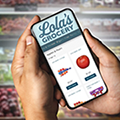
Researchers have developed a new online store that can be used for testing the impact of different policies and interventions on consumers’ purchasing behavior. Lola’s Grocery was designed to have the look and feel of a typical modern online grocery. Users can search for a bag of organic Gala apples or a carton of white […]

